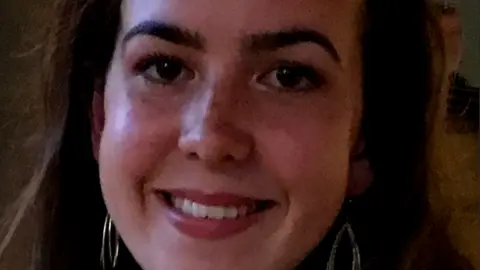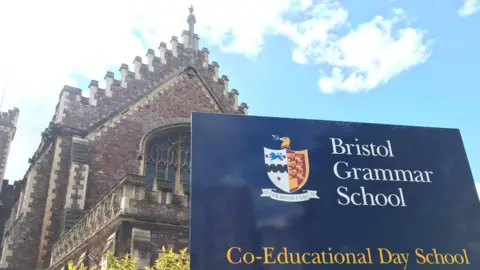Ana Uglow: Antibiotics 'would have prevented cardiac arrest'
 BBC
BBCA teenager who died from sepsis would not have suffered a cardiac arrest if she had been prescribed antibiotics, an inquest heard.
Bristol Grammar School pupil Ana Uglow, 17, was on a school history trip in New York when she died in December 2019.
She was described by a consultant as previously having been fit and healthy.
The inquest heard she had enquired about seeing a doctor if her condition deteriorated but her teachers said she had not asked to see one immediately.
Ana's teacher, Ellice Clare, added she would never refuse a pupil's request to see a doctor.
A report by New York's chief medical examiner concluded Ana, of Redland, Bristol, died from bronchopneumonia and sepsis complicating an influenza upper respiratory infection.
'Overwhelming majority survive'
Intensive care consultant Dr Chris Danbury told Avon Coroner's Court that Ana was "a fit, healthy woman with no significant past medical history" before her death.
He said if she had an infection she probably became septic on 18 December and went into septic shock the next day.
"My experience is if you can initiate some kind of treatment prior to a cardiac arrest, then the overwhelming majority of people will survive," added Dr Danbury.
Ana was off school with cold-like symptoms before the trip but felt better and left for Washington on 14 December.
Her mother Natalia Uglow said Ana called her daily saying her symptoms were worsening and that she told Ana to ask to see a doctor on 17 December.
 Family photo
Family photoGiving evidence on Monday, teacher Rory Hambly said Ana had complained of feeling tired and having a blocked nose, but she had only asked about potentially seeing a doctor if she felt worse.
He insisted he told Ana she could see a doctor if she deteriorated and had suggested she take paracetamol, which she did, and she had appeared "much brighter" for it.
In his report to the inquest, Dr Danbury said he believed if Ana had been given antibiotics on 17 or 18 December she would not have had a cardiac arrest.
He added Ana probably had a chest infection on 17 December, when the question of going to a doctor was raised.
'Heart was racing'
On 18 December, Ana told her mother she had been sick overnight, something Dr Danbury said was "an indication of progression of her infection".
Ana went on a walking tour she had been reluctant to go on, her mother said, and was later seen violently coughing during a tour of the Empire State Building.
On 19 December, Ana woke Mr Hambly up at about 06:00 saying her heart was racing, she felt anxious and had difficulty sleeping - symptoms "consistent with the onset of septic shock", Dr Danbury said.

Ms Clare saw Ana and felt her forehead, which she said was not hot, and that her pulse appeared normal.
She then went to the hotel's reception desk to inquire about medical centres in the area. But another student ran to her and said Ana had collapsed and was not well.
Ms Clare said: "I had absolutely no idea what I was going to be faced with when I got there.
"I saw Ana lying in her room with [Mr Hambly] saying 'Ana can you hear me, can you hear me'. He started to do chest compressions.
"I still can't comprehend what we saw on that day, I don't believe it and I was stood there."
The emergency services were called at 08:15 and Ana was taken to New York's Mount Sinai West hospital, where she was pronounced dead at about 10:00.
Dr Danbury said the timings showed Ana had been in cardiac arrest for nine minutes before the paramedics arrived.
"Nine minutes of cardiac arrest due to septic shock is a very, very long time," he said.
The inquest continues.
